U.S. Central Asia policy discussion with Congressman Adam Smith (D-Washington), ranking member of the House Armed Services Committee: What are Washington's current priorities in the region, including Afghanistan? What did the most recent Congressional delegation discuss in Tashkent? How well do American lawmakers understand the situation in Central Asia? Full interview. Full interview.
Navbahor Imamova, VOA Uzbek: Thank you so much for finding time in your very busy schedule today to talk with us. It's not every day that we get to discuss Central Asia on the hill. Not many of your colleagues are willing to discuss the region because they either don't know much about it or they haven't focused on it for a while. So it's very daring of you to sit down with us. We appreciate it. You were in Uzbekistan in March.
Congressman Smith: Yes.
Navbahor Imamova, VOA Uzbek: You held some high-level meetings, including with the Uzbek President Shavkat Mirziyoyev. But what did you discuss? What was your mission?
Congressman Smith: Well, I mean, overall, we're trying to build better relations all around the world for a variety of different reasons. Number one, we're interested in peace and stability since the end of the Cold War, breaking up the Soviet of the Soviet Union. You know, Central Asia has been adjusting to that new reality, trying to build an economy and relationships.
But, you know, specifically, we are in competition with China and Russia right now. You know, how to describe this competition... Basically, we're trying to move towards a more peaceful and prosperous world. We need allies and partners, and we want to let nations know that we can be helpful as well. So, you know, that's what we're working on right now, to build and strengthen relationships wherever we can, and to better understand the world. Because this is a global thing.
And, you know, we, if we're going to go to the rest of the world and say, you know, we're worried about what Russia is doing in Ukraine, we're worried about what China might be doing with Taiwan or the Philippines, and if we're going to want their help in some way, we need to be able to help them.
Navbahor Imamova, VOA Uzbek: Was this your first time in Central Asia?
Congressman Smith: Depends on how one defines Central Asia.
Navbahor Imamova, VOA Uzbek: Well, including Afghanistan now.
Congressman Smith: I spent a lot of time in Afghanistan and Pakistan over the course of the last 15 years. I've been to Afghanistan and Pakistan a lot, but it was my first time in a country other than those two. I've been to India a couple of times as well.
Navbahor Imamova, VOA Uzbek: And as the chair and now the ranking member of the Armed Services Committee, you have focused on the region for a while.
Congressman Smith: Absolutely. Absolutely.
Navbahor Imamova, VOA Uzbek: And what we hear a lot, both from the State Department and also from the Pentagon, is that counterterrorism is still one of the priorities when it comes to the region. What does that mean? What is the United States doing with the Central Asian governments in terms of countering terrorism?
Congressman Smith: Well, that's a better way to focus. Focus on our interests in the region. Counter-terrorism is one big one. You know, as I said, concerns about China and Russia are also there as well. Counterterrorism at the moment, you know, and there's a variety of different organizations, but ISIS is most prominent. The attack in Moscow came from, you know, Tajikistan, apparently. And, you know, what are the efforts and radicalization is part of it.
Uzbekistan is actively engaged in that. And also keeping an eye on what's going on in Afghanistan. Obviously, Uzbekistan is close and could potentially be a partner in tracking ISIS or other extremist elements coming out of Afghanistan. So, you know, having a partner in the region that we can work with to identify potential threats, and also crucially, as I said, encounter radicalization, you know, just an effort to try to make sure that the ideologies don't take hold or grow that produce terrorists, like the ones that struck in Moscow.
Navbahor Imamova, VOA Uzbek: Tashkent claims to have the tightest relationship with the Taliban. Of course, none of the countries in the region and around the world has recognized the Taliban as the new government of Afghanistan, but the neighboring countries are working based on their mutual interests with Afghanistan. Uzbekistan has been trying to push for more aid for the Afghan people and it's offering its space and facilities for these purposes.
But we know covering Washington, covering U.S. foreign policy, that Afghanistan doesn't seem to be a priority anymore. And so would you agree with that? And also, what can you do with the Central Asian governments to help Afghanistan at this point?
Congressman Smith: Well, first of all, I wouldn't say Afghanistan is not a priority. We are still... We know the Taliban have done partnerships with Al-Qaeda. Al-Qaeda still is in the region. ISIS, obviously, Taliban's fighting ISIS-K.
So we are still very interested in the region. The difference is we're not there. So we don't have as good an ability to keep an eye on it and act. So we are looking for partners. But the other piece of your question that's interesting is, you know, Uzbekistan's interests. I mean, I had never heard the phrase "double landlocked country" until I showed up in Uzbekistan. Apparently, they and Liechtenstein are the only two. And Liechtenstein's got a little bit less of a concern about this.
So, you know, they're interested in trying and their only access, and this is something that really struck me. You know, they are a double landlocked country surrounded by a whole bunch of countries that were sanctioning. Russia, China, Iran, Afghanistan, and they are trying to figure out how to do business, grow their economy and create prosperity in that environment. And we need to think about that. What can we do to help Uzbekistan?
As you probably know, they're very interested in getting access to the sea through a rail line that they'd like to run through Afghanistan. That would help Uzbekistan. That would help the government in a variety of different ways. So how do we do that while we're continuing to sanction Afghanistan?
Navbahor Imamova, VOA Uzbek: So those are the things that are on your mind here, in your committee and among your colleagues?
Congressman Smith: Yeah, because I think, you know, one of my big theories about the role the U.S. should play in the world is that, you know, we are not going to dominate the globe anymore, okay? We have got to work with partners and partnerships going forward. And, you know, so how are we gonna do that? You know, part of what we've done to date is we have used our economic power in many instances to influence countries when we don't think they're doing the right thing. We're trying to do that with Russia right now.
But Iran, Russia, and China, they're trying to build an alternative model so that they are not as vulnerable to our economic power. The BRICS countries have certainly put together their efforts and others as well. So I think we need to be more cautious about using our economic power in that way. I think it is likely to alienate more countries and force them, you know, to come up with alternatives. And the alternatives are out there now.
Russia, China, Iran, you know, the BRICS nations. So I think we need to be more strategic about how we build those relationships and think about the interests of the countries we're working with and not just use economic threats.
Navbahor Imamova, VOA Uzbek: The widespread criticism about the United States and the region is that, unlike Russia and China, it doesn't do anything tangible, that it has active diplomacy, it helps assists technically and then works through the international financial institutions, through the World Bank, the IMF, but it doesn't build infrastructure.
It doesn't do anything concrete when it comes to very concrete needs that the region needs. For example, regional connectivity, as you just mentioned, Uzbekistan and other countries want to get to the ports of Pakistan through Afghanistan. Of course, that's very difficult with the situation as it is in Afghanistan. So what kind of a unique role do you think the U.S. should play in the near future in this reality?
Congressman Smith: Well, I mean, one, security partnerships. We can certainly help them with training and equipment to meet their security needs as part of it. And then it's not insignificant the role we play with the IMF and the World Bank and other international aid organizations that help them. So I think those things can help strengthen that partnership. The other piece of it, of course, is, you know, I mean, Uzbekistan is still subject to Jackson Vanik, you know, for a legacy from when they were part of the Soviet Union. Ironically, Russia is not subject to Jackson Vanik.
Now, we waive it on a typical basis, but getting any sort of consistency from that when every year you're not sure where it's going to be. So we're very interested in trying to give Uzbekistan that permanent waiver from the Jackson Vanik.
Navbahor Imamova, VOA Uzbek: You are one of the lawmakers pushing for it, right?
Congressman Smith: Absolutely, yes.
Navbahor Imamova, VOA Uzbek: Just to go back a little bit on Afghanistan, I'm sure you are watching what other countries are doing with Afghanistan. You do not support any armed groups in Afghanistan. You do not, as far as we know, you don't support any opposition forces in Afghanistan, right?
Congressman Smith: No, we don't.
Navbahor Imamova, VOA Uzbek: But the Tajikistan is, it's harboring what's called a National Resistance Front. How do you see that picture? Does it complicate anything for you?
Congressman Smith: The whole region is complicated in that regard. And I'm not familiar with the ins and outs. I do know Pakistan is dealing with this. They've got a lot of organizations that have affiliations in Afghanistan that are committing terrorist acts within Pakistan.
And Pakistan is trying to figure out how to secure that border and how to get those terrorists out of their country. Yeah, no, it is a complicated picture in that regard. And part of it is just having, you know, U.S. leadership in the region so that we can better understand the details of what's going on there so we can speak intelligently about it.
Navbahor Imamova, VOA Uzbek: So, the United States has always assisted these countries when it comes to border security. You have funded various programs and there is a military-to-military relationship to some extent that's continuing with both Uzbekistan, Tajikistan, and also with Turkmenistan.
These three countries border Afghanistan. And that's why I was asking this question because you are training Tajik security forces as far as we know. So along that border, you have some presence of the Afghan opposition forces that Tajikistan is supporting. You don't think that that complicates the picture for you yet?
Congressman Smith: No, it certainly complicates the picture. You know, but it's a matter of balancing different needs and concerns.
The biggest need and concern that we have in the region, as you said at the top, is, you know, what's happening with ISIS-K, what's happening with Al-Qaeda, what's happening with other potential terrorist organizations that could come out of Afghanistan. So we need partners like Tajikistan and Uzbekistan to get our eyes on that terrorist threat. So yeah, no, it absolutely complicates the picture. What has changed in terms of security assistance to the region since you left Afghanistan? Not a lot.
We are trying to build up. We're trying to get to some partnerships with different countries in the region. But those relationships have not significantly increased since we left Afghanistan, and that's something a lot of people are concerned about. We don't have partners in the region who could directly help us keep eyes on the terrorist threat coming out of Afghanistan.
We're trying to build some of those relationships with Uzbekistan, and I did not go to Tajikistan, so I'm not as familiar with the ins and outs of that. But yeah, I mean, hell, we're trying to get back into conversations with Pakistan about it.
Navbahor Imamova, VOA Uzbek: So Russian media, for the longest time, has run all kinds of speculations about the possibility of the United States opening some kind of a military base somewhere in the region. And the U.S. officials have always denied that, that there are no such efforts.
Congressman Smith: That's correct. There are no such efforts. We're looking for partners. We're not looking for a presence.
Navbahor Imamova, VOA Uzbek: And by partners, you mean tighter counterterrorism partners with more rights, overflight, and other things?
Congressman Smith: Overflight is possible. Intel is helpful. Yeah.
Navbahor Imamova, VOA Uzbek: When you came back from the region with your other colleagues, we saw four priorities listed in your statement.
You mentioned countering terrorism threats, you mentioned ensuring human rights, supporting reforms, and then you mentioned regional connectivity. And we hear you talk a lot about human rights in general, both in your state and when it comes to the U.S. foreign policy as well.
We hear President Biden often denounce dictatorships and autocratic regimes around the world. But when you look at Central Asia, you are talking about a region that has deeply corrupt, deeply nepotistic, very autocratic regimes. And when you look at even the latest human rights reports by the U.S. Department of State and other establishments, these governments are major human rights violators. How much do you take that into account when you set policies?
Congressman Smith: I think this is a fundamental problem in looking at the world. I mean, governance is hard, A and B, we don't control it. We don't get to decide how Uzbekistan runs their government. And I think one of the big lessons that we should learn from the last 25-30 years now is regime change is not a smart approach. You can look at a government and you can say they should be run differently.
I mean, we have relationships throughout the Middle East, you know, that are crucial and really important to our interests and the interests of the region, in UAE, Saudi Arabia. You know, look, I don't know that there's a country in the world that can't, somebody can't find human rights violations. I think we have to be more flexible about how we work while trying to move those things in the right direction.
You don't ignore them, but if you simply say, "We don't think your elections were as free and fair as they used to be, we're out, we're not working with you." Again, it's a competition. And those countries can very, very easily turn to China and Russia and Iran, and who knows, maybe someday, North Korea. So I think we have to understand what's doable and what's realistic. And I'm always struck by a comment that a friend of mine told me, who works with the government of Cambodia.
And I forget if it's the president or the prime minister. I've never been to Cambodia. But whoever it was, explained to U.S. officials, here's the problem: "You guys want us to be with you and not with China. But with China, you know it's all money and no judgment. With you, it's all judgment and no money." And I get that.
Navbahor Imamova, VOA: You hear that in the region, too, by the way.
Congressman Smith: Absolutely. And I mean, you have to enforce the law. You have to govern. I mean, heck, we had a riot over our last election here. Democracy is difficult. Human rights are difficult. Balancing security and very, very difficult to do. And I think we need to work with countries to get better and stop cutting them off so much. And if you want to know the difference, look at West Africa.
Everyone complained about, oh, US, you're in there, you're working with countries who don't have great human rights records. True, but now that we have been driven out in Burkina Faso and Mali and Chad and the Central Africa Republic and Niger, the Wagner Group is providing security. You think they care about human rights? They don't. It's not a discussion.
Navbahor Imamova, VOA Uzbek: I'm raising this because, you know, your critics in the region and outside of the region say that, oh, the United States is very comfortable dealing with these autocrats. They're coming, shaky hands... The members of the U.S. Congress, in a way, they're endorsing these regimes.
Congressman Smith: Yeah, that's an idiotic way of looking at it. Or a simple-minded way of looking at it might be a better place. So, what do we do? Do we say, you know, when you have a regime that we don't like, we're out, we're not going to talk to you, we're not going to do business with you, we're going to try to sanction you, we're going to make it more difficult for your government to function. I mean, look, it is a more difficult equation than most people say.
They seem to think that we as the United States of America ought to be able to walk around the world and say, "No, you're doing that wrong. Fix it." So we won't work with you because of this or because of that. I, you know, I just, I think it is backing us into a corner. You know, between the countries that we won't work with because we have some complaint about their human rights record and the countries that we are aggressively sanctioning, like I said, we are pushing a good chunk of the world away from us.
And, you know, I know that you have to sometimes make decisions, but the world is the world, and you deal with the people you deal with. And if you run around saying, I'm gonna cut off every relationship where you don't live up to my ideals, I just think that's a world that's gonna have more conflict, more violence, and less human rights when you get to the end of it.
Navbahor Imamova, VOA Uzbek: But at the same time, you do monitor, you do watch what's happening.
Congressman Smith: That's what we should absolutely.
Navbahor Imamova, VOA Uzbek: You read these reports and all kinds of warnings, and you take them into account as you build these relationships.
Congressman Smith: Yeah, you have that conversation. But again, you know we're going to show up in UAE and say, hey, you have to be a democracy. Would that be a smart approach? You know, UAE very aggressively controls speech. And they do so in large part to try to stop radicalization. You know, they control what their imams can say.
And we can say, wow, that's a violation of free speech. I mean, look what happened when we got so enthusiastic about making sure that the people in the Palestinian territories had elections. Well, they elected Hamas, okay? And that was the end of elections. So I just think you have to take more of a long game. I'm not saying that human rights aren't important. They are. We want to move towards countries that have greater freedom, greater democracy, and greater respect for due process of law.
We want to move in that direction. Do we move in that direction by chopping everybody off that isn't where we think they ought to be right now? And I don't think we do. And I think we need to have a conversation about that.
Navbahor Imamova, VOA Uzbek: What did you think of President Mirziyoyev? You met him.
Congressman Smith: He's a smart guy. He's moving in the right direction. I mean, they were under the Soviet Union for how many years? Coming out of that is not easy.
I think they are genuinely trying to improve their economy, deal with terrorism, and move in a more open direction. But they've got a long way to go. No doubt about it. But again, security in any country is a very difficult balance between the rights of individuals and the need for security. We're seeing it play out in Latin America as well. A lot of chaos, a lot of violence.
And you know in El Salvador, now I think probably in Ecuador. You've got very aggressive autocratic regimes that have come in to crack down on all of that. And there is no question they violated human rights in doing it. On the other hand, you know, people are safer in El Salvador. And I'm not for the moment coming down and saying, yes, that was the right thing to do. I'm not saying that at all. I'm just saying that if you look at that and just get all judgy about it, that no, it never should happen.
You know, what about the people in El Salvador who were fleeing in the hundreds of thousands because they were facing day-in and day-out violence and they could not be protected? How do you balance all of that? And that's not happening in Central Asia.
Navbahor Imamova, VOA Uzbek: It's not happening in Uzbekistan, and you think that makes it better?
Congressman Smith: I don't know. I'm just saying that you have to balance those things. Look, I was there for two and a half days. I'm not going to say I know what the, you know, but we also read a lot about what's happening.
And I am aware of the fact that their elections have not been as free and fair as monitors would like. They don't have an open political system in terms of allowing anybody.
Navbahor Imamova, VOA Uzbek: There's no opposition.
Congressman Smith: Right, exactly. I know that. And we'd like to get to a place where they're able to do that. The harping on that doesn't necessarily make it so.
Navbahor Imamova, VOA Uzbek: So we know that Tashkent has always sought to bring two parliaments together. It wants the Uzbek parliament to work closer with the U.S. Congress, and then they also want closer ties, especially economic ties.
Congressman Smith: I want to build a better relationship there. I think it's in our interests. I think it's in their interests. I think it ultimately will be the interest in human rights. You know, because chaos does not serve the interest of the human rights of the individuals in the country. And it's just like I said, I think it is a longer play than some people would like to believe.
And if someone wants to show me a switch, we can flip, that's gonna, you know, perfect the human rights situation in any of these places or even significantly improve it. If they've got an idea for how to do that, I'm wide open to it. I can tell you from my experience, you know, the aggressive sanctioning and cutting off does not seem to be moving countries more in the direction of better protecting human rights.
Navbahor Imamova, VOA Uzbek: Are you involved with the Congressional Uzbekistan Caucus? Are you a member?
Congressman Smith: I don't know, tell you the truth. I think I am.
Navbahor Imamova, VOA Uzbek: Is there a bipartisan agreement or understanding on how the U.S. should approach Central Asia? Or would you say Democrats and Republicans differ in their approach?
Congressman Smith: Yes, they do but most members of Congress don't pay attention to that part of the world. No, there is not a well-thought-out approach. Trent Kelly is very actively engaged in Uzbekistan because of the Mississippi National Guards connection. But by and large, most members, you know, I would say, if you were to poll 435 members and over their two-year term, how many times they thought about Uzbekistan? Very few. I'd say probably 400 of them never thought about it at all. Well, there is the Foreign Affairs Committee. Probably 300 members haven't even thought about it at all. So, we are working on that.
Navbahor Imamova, VOA Uzbek: Thanks for talking with us.
Congressman Smith: Thank you very much for the interview and the time.




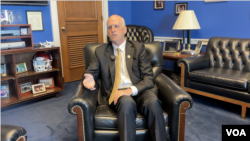
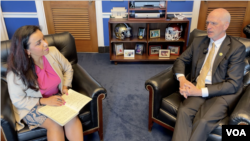


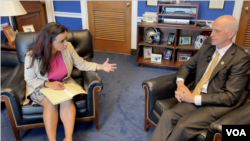
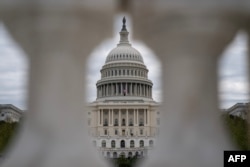
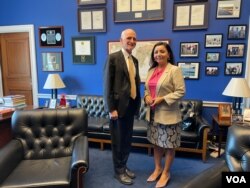




















Facebook Forum